Happy National Tie Your Own Shoes Day! The Zappos brand shoe company has a great…
The holidays are just around the corner. But as parents know all too well, the season that is supposed to be about giving all too often devolves into a frenzy of “getting” – especially as far as young children are concerned. Now is the time to teach gratitude to your kids!
So if you are looking cut through merry “buy buy buy” melodies permeating the air, there is one gift that you give your child that they won’t outgrow or forget about in a week. Best of all, it’s free!
The Gift that Keeps Giving
That gift is teaching your child gratitude.
“Gratitude benefits adults and kids alike on a very basic level. It can...cause individuals to live happier, more satisfied lives and enjoy increased levels of self-esteem, hope, empathy and optimism” –Andrea Resier at Huffington Post

Just as children have to learn how to tie their shoes or read a sentence, they have to learn gratitude. Teaching your child to be appreciative sets the stage for him/her to develop empathy and to understand that their actions affect others, just as others’ actions affect them. Conversely, children who do not learn gratitude can become entitled, disconnected from others, or perpetually dissatisfied.
Of course, this is easier said than done. Children are by nature egocentric. But just as your child needs to practice their shoe-tying skills, so too do they need to actively and consistently work to develop the skill of gratitude.
As a parent, there are many ways you can help your child learn true thankfulness.
How to Teach Gratitude to Children
Lead by example
Every day you have innumerable chances to demonstrate gratitude. Say thank you and mean it, often. Tell your children exactly what it is you love about them. Make a before-bed tradition where everyone names three things they were grateful for that day. Truly embodying the values you want your child to learn will go much further than words alone.
Say "no" sometimes
Everyone wants the best for their children. But acquiescing to every whim and whine will have the opposite effect. When there is a steady stream of stuff flowing in (without any effort on their part) children will struggle to learn to appreciate what they have rather than focusing on what they want.
Let them take ownership
Whether it is age-appropriate chores or saving their allowance to buy that toy they’ve been wanting, giving your children opportunities to take responsibility and ownership of their lives and desires helps them connect effort with the outcome, and learn to recognize and be appreciative of other’s efforts, too.
Pay it forward
Brainstorm with your children ways to help others: volunteering as a family, practicing random acts of kindness, visiting an elderly neighbor, etc. Teaching your children to actively think about others and to find ways to do good in the world will help them learn to put themselves in others’ shoes.
Gratitude Is the Cornerstone of Our Curriculum
These are just some of the ways you can help your child learn the art of appreciation within your home. At Primary Beginnings Child Development Centerss of Raleigh, learning gratitude is a cornerstone of our preschool curriculum. Our 5-star rated childcare centers are dedicated to nurturing all aspects of each and every child, from physical and educational to social and emotional development. Contact us today to schedule a tour at one of our two Raleigh locations and find out more about who we are and what we do.
